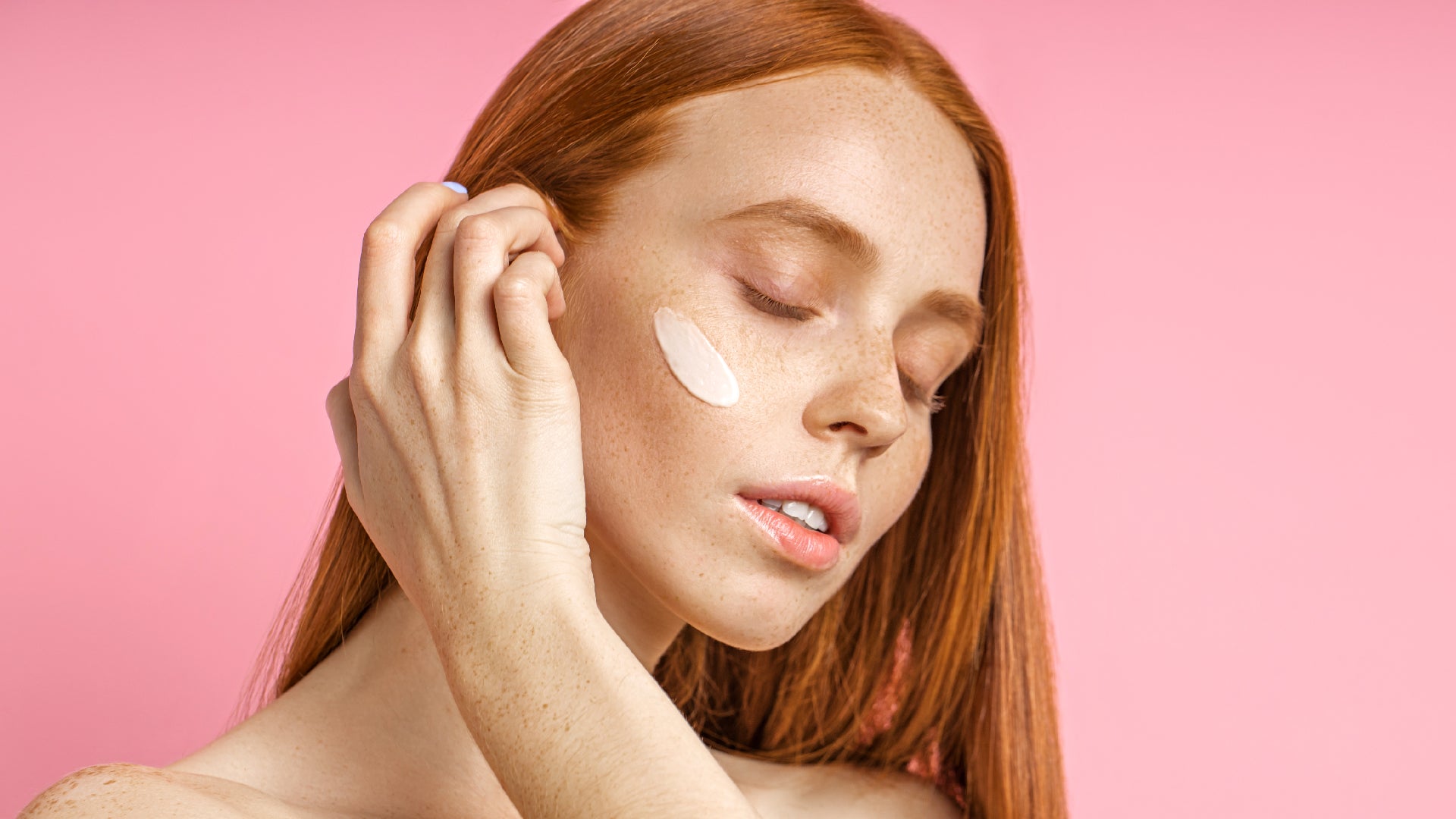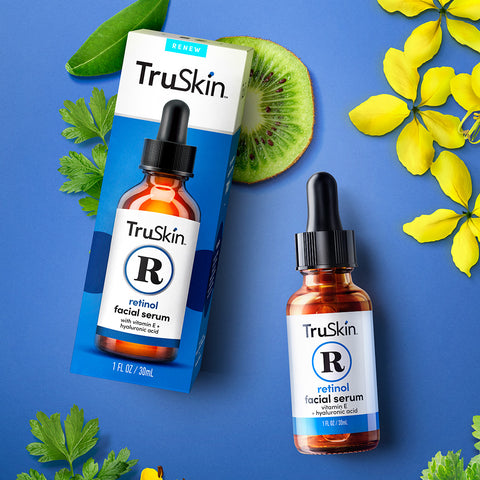
The Truth About Collagen
Collagen is one of, if not the most important building blocks of your skin. But what’s the deal with collagen loss and can skincare really help put back what’s gone? Here’s everything we know…
If you’re here, you’re probably semi-interested in your skin and how it works. And if that’s the case you’ll know a little bit about collagen and the role it plays in the overall health of your skin. Hint: it’s a LOT.
But how much do you really know about collagen? Like, what happens as you age? And what collagen in skincare truthfully means?
Interested to up your collagen knowledge (ooh, try saying that three times in a row after a few pinots!)? Then read on for the full intel…
What Is Collagen?
Collagen is the most abundant protein in the whole of your body and it’s made up of a combination of amino acids. While there are many different types of collagen, there are only four main variants, and of these, just one (type I) accounts for a whopping 90 percent of your body’s collagen levels.
Collagen is found in the body’s connective tissues and it has a kind of dense, fiber-like structure which acts like ‘glue’ to make these tissues strong, supple and resilient. You’ll find collagen in your bones, muscles, teeth and blood, but it’s most prevalent in your skin where it’s produced just beneath the surface in the dermis.
How Does Aging Affect Collagen?
When you’re young, your skin is awash with lots of delicious collagen which keeps it soft, strong, plump and wrinkle-free. However, once you hit your 20s, you start to produce around 1-1.5 percent less collagen every year. This is what’s known as intrinsic aging and it’s what causes the inevitable thinning and weakening of your skin you literally have no control over.
Of course, there are plenty of other factors at play here, too. Your lifestyle, your diet, how much sleep you get and your levels of stress all work to deplete collagen in your skin. Then, there’s the environmental stuff like pollution and UV damage that cause collagen-damaging free radicals. All this you can control and it’s what’s known in the biz as extrinsic aging.
So, Can You Slow Down The Rate At Which Your Skin Loses Collagen?
Yes and no. Intrinsic aging is a done deal and unless you’ve invented some kind of Back To The Future style DeLorean, you can’t alter time. But you can control all the other factors. The sun is the biggest player and responsible for around 80 percent of extrinsic aging, so you must protect your skin from UV damage every day by applying an antioxidant like Vitamin C Facial Serum followed by sunscreen with broad-spectrum coverage.
Getting a great night’s sleep, not smoking and reducing emotional stress are also super important. And so is your diet. Sugar and refined carbs can really screw up collagen synthesis so try to avoid these. Instead, up your intake of antioxidant-rich fruit and veggies and ensure you get plenty of protein as this helps your body produce more quality collagen in order to maintain firmer, younger-looking skin.
Meat, poultry, seafood, dairy, beans and tofu are real BFFs for quality collagen production.
What’s The Deal With Collagen In Skincare?
Experts are divided as to whether applying skincare containing collagen really works. The issue is that collagen is a large, very complex molecule making it pretty hard to penetrate the skin when applied topically. Hydrolyzed collagen (which is collagen that’s been broken down into peptides) may absorb more easily, but the jury’s still out.
If you're not convinced, stick with skincare ingredients that work to increase your own rate of collagen production, rather than to apply topical, synthetic collagen. Ingredients like retinol, MSM and vitamin C have all been studied and proven to stimulate your skin’s natural collagen production and inhibit its breakdown. Retinol, in particular, has been used for decades and has an awesome track record when it comes to upping your collagen levels.
Try Retinol Facial Serum or Vitamin C Super Serum +. And of course, don’t forget that super important sun protection to reduce the formation of free radicals in your skin and consequently decrease your risk of collagen damage.
Finally, What About Collagen Drinks & Supplements?
There's not a huge amount of evidence to support whether collagen shots or supplements can realistically make your lines and wrinkles disappear. Some research papers point to them having definite potential, but other experts believe that by the time the collagen has been ingested, digested and made its way into your bloodstream its potency and quantity could be somewhat lacking.
Again, hydrolyzed collagen supplements seem to have potential as studies show these to be more easily absorbed by your body.
Our advice for maintaining quality collagen for as long as you possibly can? Go for a healthy diet, use daily sun protection and apply antioxidants and retinol on the reg.
More About This Article
Georgia Gould
Georgia is an award-winning beauty writer who has been in the business for over 20 years. British-born, she began her career as a magazine beauty editor in London before moving to San Francisco, CA in 2012 where she now continues her love as a freelance writer and editor. As well as her editorial work, Georgia has created content for many high-profile beauty brands, including Clarins, L’Oréal, Procter & Gamble, Simple and TRESemmé. Her passions include retinol (obviously), golfing, skiing and walking her beloved Schnauzer, Dave.
You May Also Like
View More-
Neck aging is very real, so read on for some of the best skincare products for delaying fine lines, wrinkles, dryness and sagging skin on your neck.
Are you guilty of giving the skin on your neck zero attention? Warning: fine lines, wrinkles, dryness and sagging skin can creep up on your neck lightning fast. One day you’re lovingly enjoying your youthful-looking skin then before you know it, ‘bam!’ your neck looks 75 on your 45th birthday.
Why does the skin on your neck age so visibly and swiftly? Well, other than the fact that it often lacks the care and attention it deserves (entirely your fault, btw!), the structure of neck skin is also slightly different to your face. It’s thinner, for starters, which makes it more delicate and susceptible to the slings and arrows of everyday stressors like UV radiation and pollution that break down collagen and elastin and cause premature wrinkling, crinkling, crepiness and sagging. The skin on your neck also contains fewer sebaceous glands which means it lacks the sebum necessary to combat dryness and keep it soft, strong and lubricated.
But that’s not all because it doesn’t help that we’ve become a nation obsessed with our smartphones. So what, you may ask? Well, hours spent looking down whilst you scroll through YouTube videos can lead to all manner of neck, back and posture issues,. The most common and obvious to the naked eye? Horizontal bands around the neck, aka neck wrinkles or ‘tech neck.’
The good news is there are plenty of ways to deal with neck lines and wrinkles – most of which are covered right here. And our favorite? An awesome skincare routine that doesn’t stop when you reach your chin.
To follow, five of our most effective products for staying one step ahead of fine lines, wrinkles and sagging neck skin.
1. SPF 30 Mineral Sunscreen Facial Serum
We’re massive fans of treatment serums here at TruSkin and the newest addition to our serum family is a real beauty for both the face and the neck. A multi-faceted product, SPF 30 Mineral Sunscreen Facial Serum is a serum with bells on, delivering the antioxidants powers of vitamin C (or sodium ascorbyl phosphate, to be precise), alongside a broad-spectrum, all-encompassing SPF of 30 – the dermatologist-recommended level for everyday damage control. We hate to brag too much but it’s pretty much the sun protection product you’ve always dreamed of.
The thing is, though, sun protection isn't just for the face. Unless you wear scarves and turtle necks every day of your life, your neck is exposed to the elements just as much as the skin on your face, making daily SPF protection an absolute must. Also, as you now know, the skin on your neck is thin, fragile and vulnerable to premature aging so a treatment serum is going to work wonders for preserving your collagen and delaying wrinkles and a lack of firmness in the area. Simply smooth an extra drop over the neck area when you apply it to your face – after cleansing and before moisturizing. Simple.
2. Renewing Longevity Moisturizing Cream
One of the most effective ingredients for aging skin is undoubtedly retinol (more on that in a minute). However, certain types of sensitive skin don’t play well with this potent ingredient. The skin on the neck can also feel even more sensitive than that on the face, so what’s a good alternative for tackling lines and wrinkles when retinol is not a viable option? Bakuchiol.
Touted as nature’s alternative to retinol, bakuchiol offers all the same skin-rejuvenating benefits… but with fewer of the common side effects like redness, irritation and dry skin. We harness the powers of this excellent botanical in our Renewing Longevity Moisturizing Cream. Combined with hydrating aloe vera, soothing vitamin E and revitalizing snow algae it’s a winner for the face and neck area. Apply it morning and night after your serum using upwards motions to help lift and tighten the skin.
3. 6% AHA, BHA + PHA Liquid Exfoliant
As you know, a fabulous way to improve cell turnover and enhance the look and feel of your skin is to exfoliate regularly. Exfoliation encourages dead skin cells to slough away, enabling the fresh, healthier-looking ones to reveal themselves at a surface level. Of course, your skin cells do this naturally, but as you age, the process becomes slow and sluggish, allowing the old cells to sit around longer than you’d like. This can cause all sorts of issues like clogged pores, breakouts, rough texture and dull, lackluster-looking skin.
To help keep cell turnover ticking along at a decent rate, it’s smart to exfoliate two or three times a week, depending on your skin’s tolerance levels. Our 6% AHA, BHA + PHA Liquid Exfoliant is a real winner for smoothing over your neck because, instead of using physical grains which might not suit this delicate area, it’s crafted with non-abrasive glycolic acid, salicylic acid and gluconolactone, which break down the bonds between dead cells so they fall off on their own accord. Extra vitamin C also helps to brighten and protect the skin. Bonus.
4. Retinol Facial Serum
OK, back to retinol which is pretty much the queen of collagen-stimulating skincare ingredients and consistently seen as ‘the one’ for anybody over the age of 30 who’s looking to age beautifully… but not prematurely.
A derivative of vitamin A, retinol is indisputable in its powers to encourage cellular turnover and improve quality collagen in the skin. Granted, it’s not for everyone (which is where other ingredients like bakuchiol, peptides and vitamin C step in to save the day), but if you choose your formulation wisely, patch test first and go slowly, most people are able to incorporate retinol seamlessly into their skincare regime.
Our Retinol Facial Serum, for example, is super gentle on the skin because it’s partnered with hyaluronic acid and vitamin E to hydrate and help reduce irritation. It’s so good you can even apply it to the delicate skin on your neck. Just remember, the neck area can be prone to dryness and itching so apply it to this area just once or twice a week to clean skin before bed, then increase frequency only as tolerated – if at all.
5. Vitamin C Deep Hydration Night Cream
Vitamin C is the most studied and widely used topical antioxidant in skincare. And antioxidants are crucial for aging skin because they reduce oxidative stress. What’s that exactly? Good question. Oxidative stress is the damage caused by environmentally induced free radicals which, if left to their own devices, like to seriously screw up your collagen, thus accelerating the formation of wrinkles.
After cleansing at night, our Vitamin C Deep Hydration Night Cream is an absolute dream on the face and neck because it works hard to neutralize those pesky free radicals and help reduce the appearance of neck wrinkles, face wrinkles, and other signs of aging. It also contains MSM, vitamin B5, aloe vera and a whole bunch of other skincare darlings, providing your face and neck with everything it needs to wake up smoother, softer, full of life and ready to face the day.
Anti-AgingOur Favorite Products For Tackling Neck Wrinkles
read more -
Heard about retinol sandwiching but clueless about what it is or whether you should be getting on that train immediately? Here’s what we know…
Retinol offers an incredible solution to many skin woes. Hate your monthly breakouts? Try retinol. Worried about wrinkles catching up on you way too quickly? Retinol’s your guy. It’s true, retinol is the gold standard in skincare ingredients – just ask your dermatologist; we’d put a lot of money on them being in complete agreement.
But retinol isn’t all moonlight and roses. In fact, many people find that it’s pretty devilish on their skin, causing all sorts of irritating side effects that, frankly, make it not worth the hassle. You know the score, think redness, itching, flaky skin and extreme dryness.
This is why you’ll see countless blog posts and viral videos about how best to make retinol work for your skin type without causing all the bad stuff. Spoiler alert: if you choose the right formulation and apply it slowly and carefully, most skin types can totally appreciate the benefits retinol has to offer.
Reckon you’ve tried all the tricks but still can’t get on with retinol on a regular basis? Then you have options. The first is to try bakuchiol which is a natural and far gentler alternative to retinol. We’re huge advocates of this just-as-awesome ingredient as it works in a similar way to retinol, encouraging cell turnover and accelerating collagen production. In fact, we love it so much that we based an entire collection of healthy aging formulations around it. Check out the range here.
The other options is to try retinol sandwiching, a ‘trend’ that #BeautyTok is all over, but one which, in fact, has been around for many years…
What Is Retinol Sandwiching?
Retinol usually comes in the form of a serum which is applied to cleansed skin before moisturizer. Retinol sandwiching, however, switches things up. Don’t worry though, it’s nothing too tricky but is a very easy technique. You simply apply moisturizer before your retinol serum, then another layer afterwards, creating the proverbial sandwich effect with the retinol being your filling and moisturizer the bread.
Why Is Retinol Sandwiching A Thing?
As skincare ingredients go, retinol is arguably the best but, as we previously mentioned, its benefits are often outnumbered by its downsides – especially if you have particularly sensitive skin. Of course, introducing it slowly into your skincare routine is a great way to reduce the risks of unwanted side effects because this allows your skin to acclimate to such a potent powerhouse.
And there are many other ways to help you reduce irritation. One of which is the retinol sandwich.
Not to be taken literally (please don’t smother retinol serum over your favorite sourdough – like, ever), retinol sandwiching is particularly good for dry skin but can be a useful tool for reducing all kinds of irritation and sensitivities.
Why is the retinol sandwich so good for the skin? Well, it creates a kind of buffering effect, adding a layer of product between your skin and the retinol which helps to slow down its absorption and reduce its potency. Not to mention the added moisturization as an extra bonus. All this means that you’ll likely be able to use your retinol serum more frequently.
Does Sandwiching Make Retinol Less Effective?
Yes. Most moisturizers contain oils and water which kind of ‘dilute’ the retinol, making it weaker and less effective. But if you’re choosing to make yourself a retinol sandwich, you’re probably doing so because you have sensitive skin and want to reduce the irritation it may potentially cause. So making it weaker is kind of the point, right?
Is Retinol Sandwiching Right For Your Skin Type?
Honestly? That’s a question only you can answer. The truth is, if you use it wisely, most retinol formulas can be successfully built into your skincare routine without the sandwich method. That being said, nobody knows your skin better than you, so if you feel it may help you to enjoy the benefits of retinol, there’s no harm in trying.
All we can say is that if you want to give it a go, make sure to choose the right moisturizer for the job. Here’s a quick checklist for you.
✅ Go for a lightweight lotion. This will be better than a rich, heavy cream because it will at least allow a little of the retinol to get through to the surface of your skin.
❎ Avoid moisturizer that contains potent, active ingredients. Certain ingredients may react with the retinol and actually increase your chances of redness and irritation.
✅ Look out for gentle hydrating ingredients. Things like hyaluronic acid, glycerin and aloe vera are your friends here.
Other Tips For Making Retinol Work For You
1. Always Patch Test Retinol First
Yes, patch testing is boring and certainly not for the impatient, but it’s important and a great way to know whether a certain ingredient is going to be the right match for your skin. Patch test any new retinol product on a discreet area of your skin first. Then leave it for 48 hours to check for adverse reactions before using it as recommended.
2. Use It On Dry Skin
Many ingredients play well on damp skin but moisture can increase the absorption of retinol, simultaneously increasing the chances of irritation. Better to be safe by applying it to skin that's dry.
3. Go Slow And Go Steady
We’re all about the 1-2-3 retinol rule. When starting out, apply your product once a week only, for one week. Then apply it twice a week for two weeks and finally, go for three times a week for three weeks. This helps your skin build tolerance and allows you to eventually be able to apply it every night.
4. Apply Sunscreen Every Morning
Don’t let damaging UV radiation screw up all that fresh new skin retinol is helping to bring to the surface. Generously apply SPF 30 Mineral Sunscreen every morning as the final step in your routine.
But you knew that. Didn't you? DIDN'T YOU?
RetinolThe Pros & Cons Of Retinol Sandwiching
read more -
Skincare ingredients can be confusing, but when it comes to collagen stimulation and wrinkle reduction, peptides are worth knowing about. Here’s what we know…
If you’ve ever found yourself confused by skincare ingredients don’t worry, you are not alone. Mysterious ingredients like kojic this and azelaic can dumbfound even the biggest skincare aficionados. But while they might sound super intimidating, these science-based actives are often some of the most effective ingredients you can use on healthy aging skin.
On that note, let’s talk about peptides. Major news in skincare right now, peptides are short chains of amino acids which, as you know, are the building blocks of protein. Like tiny little messengers that communicate with your skin at a cellular level, peptides deliver a whole host of incredible benefits, triggering specific responses like skin barrier repair and collagen production. By telling the cells exactly what to do and accelerating healing, renewal and rejuvenation, they’re vital for the health of your skin.
A Quick Lesson On The Different Types Of Peptides
Not only are there thousands of active ingredients available in skincare, but there are tons of peptides alone: often with hand-scratching names, numbers and spellings. Here’s a quick run-through of the four main peptide types to know…
Signal Peptides: the most common peptides found in skincare, these send signals to specific cells prompting them to produce collagen, elastin and other important proteins. Examples include Matrixyl 3000, palmitoyl tripeptides and palmitoyl oligopeptide.
Carrier Peptides: these peptides work by transporting essential minerals and nutrients to the skin to aid healing and encourage collagen synthesis. They’re like the delivery systems of the peptide world. The most common and well-researched are copper peptides.
Neurotransmitter Peptides: by targeting muscle contractions, these peptides are thought to relax the facial muscles thus helping to soften expression lines and delay etched-in wrinkles. Acetyl hexapeptide-8 (aka Argireline) and tripeptide-3 (aka Syn-Ake) are popular examples.
Enzyme-Inhibitor Peptides: great for strengthening and preserving the skin, these work by blocking certain enzymes that are known to break down collagen and elastin. Matrixyl 3000 also comes under this umbrella, as does acetyl hexapepetide-8.
The Power Of Peptides In Skincare
The great thing about peptides is that, unlike larger proteins which are unable to penetrate the top layers of the skin, they're small enough to communicate with the skin at a much deeper, cellular level. This makes them a must in any skincare routine because the benefits are huge. Keep scrolling to learn about the most important benefits of peptides.
1. All The Collagen Love
Undoubtedly the biggest draw for including peptides in your skincare routine is for their proven abilities for boosting collagen production. With the exception of neurotransmitter peptides, they all work hard to increase collagen synthesis, some by more than 100 percent.
Signal peptides, for example, send direct messages to the dermal fibroblasts – the fibrous connective tissue cells that, among other things, are responsible for producing collagen, elastin and hyaluronic acid. They basically give these cells a gentle nudge to work harder and faster. What does that mean for your skin? Strength, structure, radiance, lift, smoothness and youthfulness. Need we go on?
2. Softer-Looking Wrinkles
Of course, more quality collagen in your skin automatically means you will age more slowly so signal peptides, carrier peptides and enzyme-inhibitor peptides are the bee’s knees for keeping your fine lines and wrinkles under control. But don’t forget neurotransmitter peptides like acetyl hexapepetide-8. While these don’t improve collagen production, per se, they temporarily work to relax your facial muscles – kind of like Botox without the needles.
Don’t get us wrong, topical skincare is never going to offer the kind of dramatic wrinkle reduction effects you’ll get from injectable treatments, but with consistent use, neurotransmitter peptides show great promise for helping to soften the visible appearance of expression lines.
3. A Better Barrier Function
Carrier peptides are incredible for improving wound healing and strengthening the skin’s barrier function. Quick reminder: your barrier function is the super important but extremely fragile uppermost layer of the skin, aka the stratum corneum. This protective layer works relentlessly to help your skin retain moisture, while keeping nasty things like allergens, irritants and pollutants from penetrating through the skin and causing a negative reaction. As skin ages and life (stress, UV radiation, pollution) gets in the way, this barrier can become compromised, allowing moisture to escape and irritants to get in. Cue dryness, dehydration, sensitivities and all sorts.
All this is why barrier care skin formulations are so important. And peptides check that box with bells on. Copper peptides, in particular, have shown to significantly increase skin thickness and elasticity while encouraging the skin’s natural repair process.
4. Youthful Skin That Snaps Right Back
While collagen is vital for the look and feel of healthy skin, elastin is equally as important. Elastin is another structural protein in the skin but while collagen gives strength and stability, elastin allows it to stretch, flex and bounce back with your face and body's movements and expressions. It basically ensures that your skin remains firm and smooth, rather than saggy and lax.
Elastin production also decreases with age (no surprises there!), causing your skin to lose its natural, bounce-back quality. But good news: signal peptides stimulate elastin synthesis, encouraging your skin to retain its plump youthfulness.
5. Awesome Pore Control
Your pores are a crucial part of the structure of your skin. They allow important liquids, particles and gases to pass through the surface, helping to regulate body temperature and lubricate the skin. They can also (annoyingly!) stretch and appear larger with age as collagen and elastin fibers become weak and the walls of the pores become equally slack and kind of baggy-looking.
Enter the collagen and elastin-boosting powers of peptides. Stronger proteins in the skin = tighter-looking pores. Makes sense, right?
How To Work Peptides Into Your Skincare Routine
The key to getting visible results from peptides in your daily regime is to go for leave-on formulations that can be layered underneath your moisturizer. AKA, the mighty serum.
Search out peptide serums that contain a few different types in order to maximize their benefits. Our Peptide Facial Serum, for example, is crafted with an incredible peptide complex blend including palmitoyl tripeptides-1 and -5, plus palmitoyl tetrapeptide-7, all of which are lauded for their collagen-pumping, elastin-boosting, hyaluronic acid-enhancing abilities. Oh, and Peptide Eye Gel is another skincare great that shouldn’t be ignored.
Because neither should the skin around your eyes.
Skincare ingredientsWhy Peptides Could Be The Missing Link In Your Skincare Routine
read more -
Stay ahead of soaring temperatures and irritated skin with our easy-to-follow tips for caring for sensitive skin in the sun.
Sensitive skin can get all kinds of crazy during the summer months as the heat rises, the beach beckons and A/C gets serious. And the fact that somewhere between 50 and 70 percent of adults report having some level of sensitive skin means that potentially a whole lot of people are dealing with redness, itching, dry skin and/or discomfort right now.
Of course, there are many causes of sensitive skin, many of which are complex little beasts. But if your sensitivities are triggered by things like sunscreen, swimming, soaring temperatures and air conditioning, read on to discover the best ways to keep your skin happy this summer.
Choose Mineral Sunscreen
Sunscreen is non-negotiable, no matter your age, gender, skin color, skin type or level of sensitivities. If your skin often feels a little ‘off’ after applying SPF, however, switch to a mineral formulation that contains physical filters like zinc oxide or titanium dioxide.
Mineral sunscreens are highly regarded as the smart option for reactive skin as they aren’t absorbed into the skin. Instead they act as an invisible shield on the skin’s surface which blocks UV radiation and delivers immediate protection without causing the irritation often linked to chemical-based formulas. Both of our sunscreens are crafted with zinc oxide – in our opinion, the gold standard of sun protection – and deliver incredibly lightweight protection with a broad-spectrum SPF 30.
Say No To Hot Showers
It’s not often you want to crank up the water temperature in the summer, but should you be tempted by a hot shower or bath, know this. Scorching hot water messes with your skin’s barrier function, stripping away many of its vital oils and proteins thus leaving it vulnerable to dryness and redness. Do you often jump out of the shower and notice your skin looks red? This is a sure sign that your shower was way too hot. Turn. It. Down. Lukewarm temps are way more refreshing in the summer, anyway.
Avoid Synthetic Fragrances
Take a good look at the ingredients in your skincare regime to check for common skin irritants that could be triggering your summer flare-ups. Fragrance, for example, is known to be the number one irritant and the biggest cause of cosmetic contact dermatitis in the US so avoiding that should be your first port of call.
Other potential no-nos that have the potential to mess with your barrier function include strong surfactants like sodium lauryl sulfate (SLS) and sodium laureth sulfate (SLES), preservatives, dyes and potent alcohols like ethanol, isopropyl alcohol and denatured alcohol (aka alcohol denat). These can all strip away the skin’s natural oils, leading to dryness, redness, itching and more.
Wear Loose, Cotton Clothing
It’s super important to wear lightweight, loose-fitting clothing in the summer to minimize sweating and reduce your risk of skin sensitivities like burning and itching. This is especially important if you suffer from ongoing summertime skin issues like prickly heat or folliculitis. Organic cotton clothing is ideal but other natural fibers like linen are similarly better than man-made fabrics.
Cleanse Gently
The best cleansing technique requires the gentlest of touches – even in hot weather. Granted, it’s tempting to cleanse more vigorously in the summer when you sweat more and have extra layers of sunscreen on your face, but if you rub away at your skin using overly potent formulations your skin will not thank you for it. Think breakouts, freakouts and anything else your skin likes to do when it’s unhappy.
Instead of this utter madness, use a kind-to-skin cleanser that contains hydrating ingredients as well as those that help to remove impurities after a day in the heat. We love Vitamin C Brightening Cleanser which is formulated to suit all skin types and deep cleans the skin without drying it out. Spend a few minutes massaging it gently into your skin morning and night and rinse thoroughly with lukewarm – never hot, remember? – water.
Be Smart With Your A/C
Going inside to take a break from the heat and damaging UV rays is a smart move… but watch out for overly zealous air conditioning. A/C feels like bliss at the time but not only does it cool the air but it also removes moisture which can dehydrate your skin and give you the itch.
To minimize the risk of A/C skin meltdown (uncanny, right?), keep yours at the recommended comfortable temperature of around 78 oF. Added bonus: as well as saving your skin it’ll also save you a good wad on your utility bills.
Double Down With Moisture
Extra hydration is crucial during the summer months to help minimize the drying effects of all the summer greats – eg. swimming pools, the ocean and air conditioning – and keep your skin healthy, strong and itch-free. And the best trick for the ultimate moisturization? Layer it on with serum and moisturizer.
Hyaluronic acid, aloe and glycerin are important ingredients to look out for here as these draw water to the surface of the skin. But you must also include ingredients in your moisturizing routine that help to seal water in – otherwise it'll evaporate lightning fast meaning all that hard work will go to waste. Shea butter is a favorite of ours as it creates a lightweight seal on the surface of the skin without clogging up your pores. Jojoba oil, vitamin E and ceramides also have equally incredible moisturizing superpowers. Try the combination of Niacinamide (B3) Facial Serum (so good for sensitive skin) followed by Collagen Day Cream (ditto!).
Shower After Swimming
Chlorine is essential for pool hygiene but, if you have reactive skin, this powerful detergent can strip away at your skin’s uppermost layers, screwing up the pH level and unbalancing your skin’s delicate microbiome. The results? Anything from dryness and itching to full on eczema flare-ups.
If you love a good al fresco dip in the pool make sure to apply water-resistant sunscreen first (this’ll create a kind of barrier against chlorine disruption as well as UV damage); and shower as soon as you leave the pool. If it’s not possible to take a proper shower, rinse yourself in fresh water, then shower thoroughly at the end of the day. Same applies after going for a dip in the ocean.
Skincare TipsThe Best Ways To Care For Sensitive Skin In Summer
read more



















